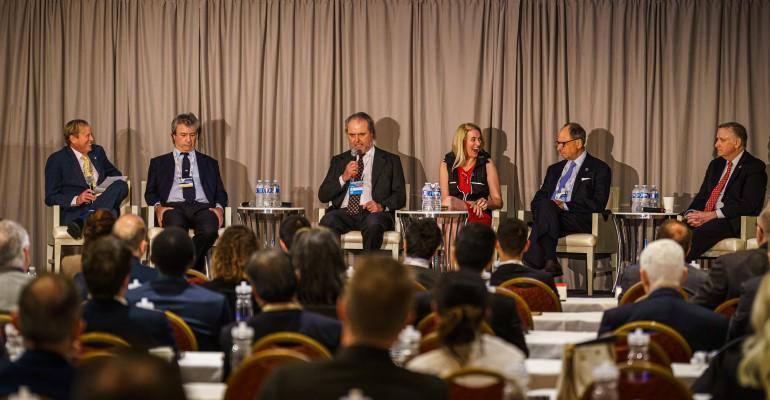Speaking at the CMA Shipping 2023 Commodore Debate in Connecticut, Evensen predicted that at some point in the next 20 years the industry will work out the right technology for the next generation of vessels. Then the orders will be made and a brand new generation of expensive vessels will hit the water and a competition will play out between the owners of the old and the new.
“It'll be fought in the regulatory area, because all the people who order new ships will want to try and regulate the old ones out of existence, but then everyone else will say ‘well, you need us,’ so it'll be a great fight,” said Evensen.
Regulators had made shipowners disciplined for now, said Evensen. “None of us know what to order... I would say that these are very interesting times, because the undoing of all great shipping markets has been the ordering of vessels.”
Paolo d’Amico, President and CEO at d’Amico International Shipping (DIS), this year's Commodore in a first ever joint award with his cousin Cesare, said that placing orders of vessels running alternative fuels was almost impossible without the backing of a major charterer.
“It's difficult on a speculative basis to say which technology will win because it costs hope and they [owners] are not prepared to pay, so they prefer to freeze orders,” said Paolo.
Within dry bulk shipping, co-operation between large charterers and owners is restricted to the capesize segment and even there it is very limited, said Cesare d’Amico, CEO at d’Amico Società di Navigazione S.p.A.
“It is a fact also that the dry bulk industry has always been more resilient in terms of changing, because regulation has also been very much slower than what has been seen on the tanker side. As you know, dry bulk it is a much more fragmented industry,” said Cesare.
One such long term charter agreement between International Seaways and Shell enabled the building of three dual-fuel LNG VLCCs, although CEO Lois Zabrocky joked that she’d happily take another if Daewoo shipyard had one.
“We are super excited to take delivery of these VLCCs and they've got these massive manganese LNG tanks on the deck. They’ll be on charter for seven years to Shell in a partnership construct. I'm very hopeful that we're going to see more of that type of partnership.
“I understand that in the 70s and 80s, that's the way the tankers were. I think that it's going to take some time to get back to where we could try to bring charterers and owners closer together again, but there's always hope that you can de risk some of these investments as opposed to simply, you know, taking it all in the owners back,” said Zabrocky.
John Hadjipateras, CEO & President at Dorian LPG Ltd. has a strong orderbook in his market segment, but is happy with where the market is going. “What's next is good, I think, across the board. There are some dark clouds, but the main thing on the longer term that we have to think about is the next 20 years will not be like the last 20 years in terms of we're not going to have a China powering trade.
“So hopefully that market is mature enough and shipbuilding capacity hasn't caught up, and it will be able to sustain profitability for the foreseeable future,” said Hadjipateras.
Copyright © 2024. All rights reserved. Seatrade, a trading name of Informa Markets (UK) Limited.
Add Seatrade Maritime News to your Google News feed.  |

